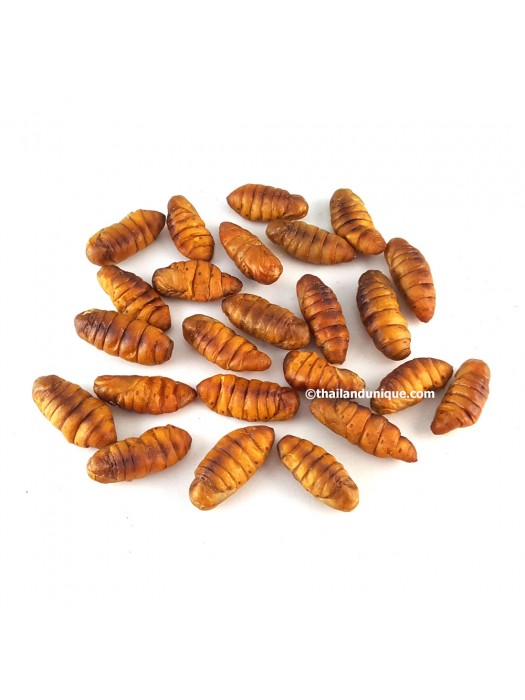This product will be shipped from EU or the USA depending on your location.
Dehydrated Silkworm Pupae
Dehydrated Silkworms (Bombyx Mori) – 500g
Silkworms have an awful lot going for them. Not only are they used to make sumptuous Thai silk garments but their pupae by-products are tasty too! Sometimes, when you feel like a late-night snack and nothing else will quite hit the mark, you find yourself craving the larvae of the domesticated silk moth. What else?
Silkworms have a crunchy exterior and, reportedly, the taste and texture of mashed potato inside when fresh! Ours can be eaten straight from the bag and are low in fat, high in protein and a great source of essential fatty acids. The nutritional alternative to toast and biscuits.
Ingredients: 100% premium dried silkworm pupae. No preservatives or colours added.
Shelf Life is 12 months from date of manufacture.
Weight 500g
Medical publication abstract:
The percentages of total protein and lipid contents by dry weight were 55.6 and 32.2%, respectively. Silkworm pupae protein had high levels of essential amino acids such as valine, methionine and phenylalanine. The contents of essential amino acids in silkworm pupae protein satisfied the FAO/WHO/UNU suggested requirements (2007). In addition, they also possessed n-3 fatty acids, especially α-linolenic acid (36.3%), as a major component. The 50% ethanol extract of silkworm pupae contained 1-deoxynojirimycin (DNJ), which is a potent α-glucosidase inhibitor. These results suggest that silkworm pupae are a new source of high quality protein, lipid, and α-glucosidase inhibitor.
Source: http://www.ncbi.nlm.nih.gov/pubmed/21422715
Nutritional content of Silkworm pupae (Bombyx mori) per 100g dried sample
Protein 55g
Fat 8.5g
Fiber 6g
Carbohydrates 25.43g
Energy content – 389.60 (Kcal/100g)
Mineral composition (mg/100g)
Calcium 102.31 mg
Potassium 1826.59 mg
Magnesium 287.96 mg
Phosphorus 1369.94 mg
Sodium 274.57 mg
Iron 9.54 mg
Zinc 17.75 mg
Manganese 2.49 mg
Copper 2.08 mg
Selenium 0.08 mg
Vitamins:
Vitamin A 273.99 micrograms
Vitamin E 51.45 IU/kg
Vitamin C <5.78 mg
Vitamin B1 1.91 mg
Vitamin B2 5.43 mg
Vitamin B3 15.20 mg
Vitamin B5 12.49 mg
Vitamin B7 144.51 micrograms
Vitamin B9 0.41 mg
Source: Nutritional composition and safety aspects of edible insects




